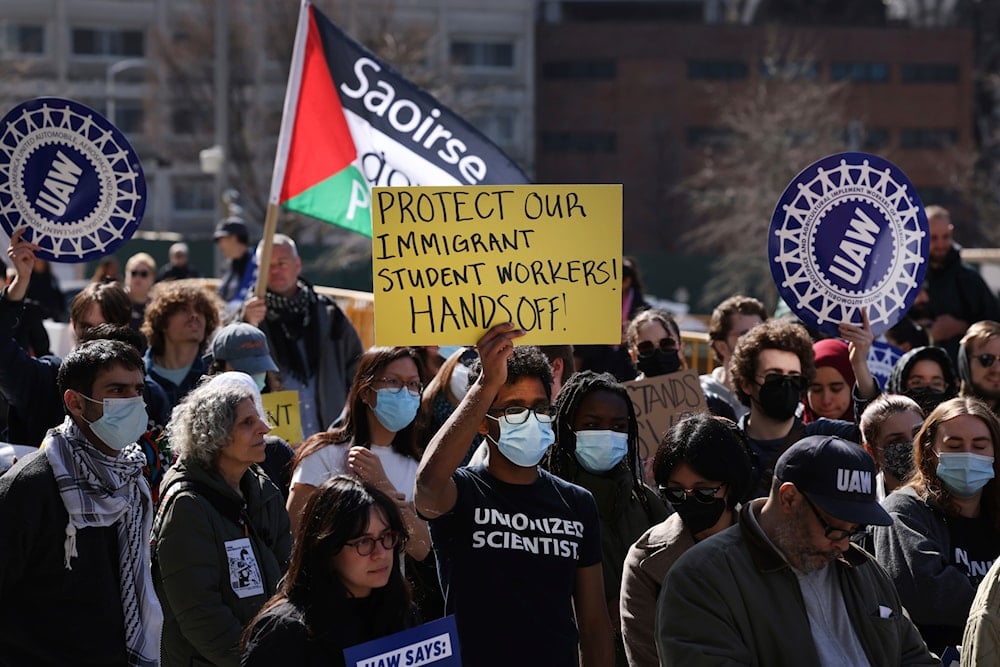Trump administration weighs consent decree to control Columbia: Report
A consent decree—an agreement overseen and enforced by a federal judge—would be an unprecedented move in the education sector.
-
 Members of Columbia University's student workers union and their supporters protest the detention of Palestinian activist Mahmoud Khalil and recent actions taken by the Trump administration against the university, Friday, March 14, 2025, in New York. (AP)
Members of Columbia University's student workers union and their supporters protest the detention of Palestinian activist Mahmoud Khalil and recent actions taken by the Trump administration against the university, Friday, March 14, 2025, in New York. (AP)
The Trump administration is reportedly considering placing Columbia University under a legally binding consent decree—a dramatic step that would mark an escalation in its campaign against the Ivy League institution, The Wall Street Journal reported, citing administration officials.
The university has already agreed to a series of reforms demanded by the administration as a condition for regaining access to $400 million in federal grants and contracts, which were suspended last month over allegations that Columbia failed to adequately address 'antisemitism' on campus.
A consent decree—an agreement overseen and enforced by a federal judge—would be an unprecedented move in the education sector. It would effectively place the university under judicial supervision, compelling it to follow terms dictated by the federal government. Columbia would need to agree to such a measure, and according to the Journal, it remains unclear whether its board has been consulted on the idea.
In response to a query from The Guardian, a Columbia spokesperson did not directly comment on the report, stating only, “The University remains in active dialogue with the Federal Government to restore its critical research funding.”
The proposal reportedly originates from the administration’s antisemitism task force, which includes lawyers from the Justice Department. The Journal notes that some officials within the group have questioned whether Columbia is acting “in good faith.” Should the university reject the proposal, the Justice Department would be required to make its case in court—a legal process that could stretch out over several years, during which federal funding could remain frozen.
A high profile target
The Trump administration and its Republican allies have made Columbia a high-profile target, especially in light of its role in the nationwide student protest movement sparked by the ongoing Israeli genocide in Gaza. In a high-profile arrest last month, federal immigration officials detained Mahmoud Khalil—a Columbia graduate and vocal Palestinian rights advocate—who had participated in campus protests. Khalil remains in federal custody.
At a cabinet meeting on Thursday, Donald Trump pressed Education Secretary Linda McMahon for details on how the administration is withholding federal funds from institutions that are “not behaving.”
Trump specifically asked whether Columbia’s funding was being held back. McMahon confirmed it was and listed other universities, pointing out that the administration had frozen nearly $1 billion in federal support to Cornell University.
“We’re getting calls from the presidents of universities who really do want to come in and sit down and have discussions,” McMahon said. “We’re investigating them, but in the meantime we’re holding back the grant fund money.”
It is worth noting that Columbia faced backlash from academics and free speech organizations after agreeing to major changes demanded by the Trump administration. These included placing its Middle Eastern studies department under the new administration, banning face masks on campus, granting campus security officers the authority to remove or arrest individuals, and increasing "intellectual diversity" by expanding its Institute for Israel and Jewish Studies.
Read more: How Columbia University is the new face of the Intellectual Intifada

 3 Min Read
3 Min Read








